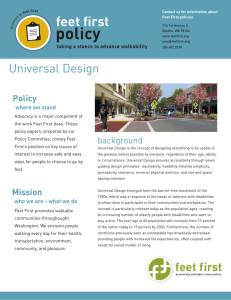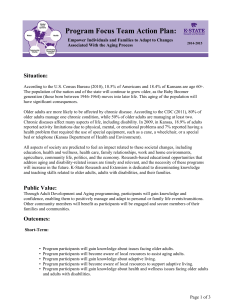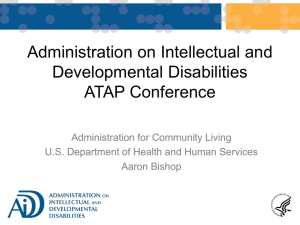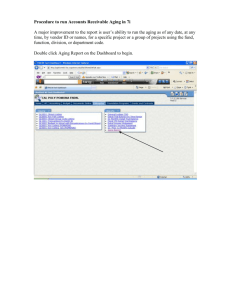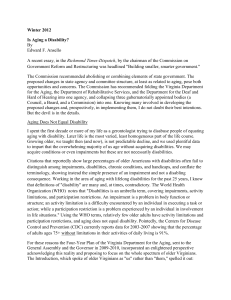Aging of Americans with Disabilities A Discussion
advertisement
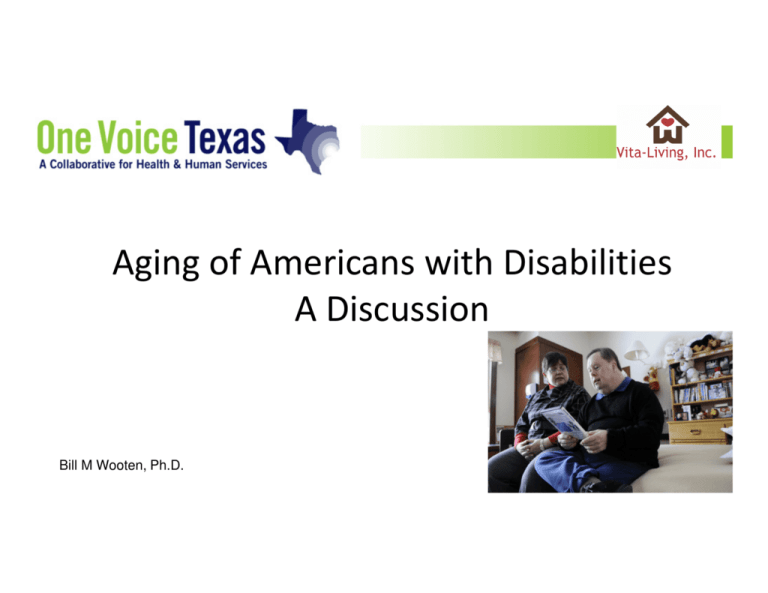
Aging of Americans with Disabilities A Discussion Bill M Wooten, Ph.D. Assumption • As individuals with intellectual and other developmental disabilities age, their health care and other needs often increase at the same time that the ability of their aging support provider decreases. • The number of adults with I/DD, age 60 years and older is projected to nearly double from 641,860 in 2000 to 1.2 million by 2030. Challenge • As the population ages and life expectancies of persons with Intellectual and other developmental disabilities (I/DD) continue to increase, the number of people with I/DD who will experience life transitions will increase. Many families have not made sufficient plans for this transition. Expectations • Have an dialogue about what integrated support system for individuals, who are disabled and aging, will look like. • Develop a set of next and future steps. “While this generation of older adults with I/DD had restricted options regarding supports in the community as they were growing up, the next generation of adults with I/DD and their families has grown to expect more options.” New Challenges Require New Thinking First “The world we have made as a result of the level of thinking we have done thus far creates problems we cannot solve at the same level of thinking at which we created them” – Albert Einstein How Social Change Happens C = (D + V + P) > X C = Pressure to change D = Level of dissatisfaction with the status quo V = Clear, shared vision for something better (i.e., desirability of proposed change) P = Use of process that removes obstacles blocking access to desired state X = Cost of changing Adapted from Bob Bontempo, Columbia Business School, and from Thomas Packard, http://www.improve.org/tqm.html Ground Rules for Conversations All ideas are valid Everything is captured: notes/ flip charts Listen to each other Observe time frames Seek common ground and action Differences and problems are acknowledged – but not worked on 4 Generic Questions to Start Best experience. A time when… What do you value about… yourself, work, organization. What do you think is the core life-giving factor or value of your organization –that which if it did not exist would make your organization totally different than it currently is? If you had three wishes for your organization, what would it be? What is Appreciative Inquiry? • Appreciative Inquiry is a relatively new method of organizational change that proposes that looking for what works well and doing more of it is a more motivating and effective change strategy than looking for what does not work and doing less of it. Goal for this Session • At the end of this session is to identify concrete, tangible ways to partner with everyone at the table in building a spectrum of care to help aging Houstonians with disabilities to age in place. Group Exercise 1 At the very heart of that kind of system are effective collaborations. These kinds of relationships are mutually advantageous, sustainable and empowering. Think about your job at the agency where you currently work. Tell me about an experience in that role where effective collaboration had a positive impact on your clients. Group Exercise 2 It’s 2020 and we’ve been recognized with a citywide award for our partnerships to provide continuous care to those aging with disabilities in Houston. Describe that system. How did it come about? What was your role? In every organization, something works Looking for what works well and doing more of it is more motivating and effective than looking for what does not work and doing less of it. What we focus on becomes our reality and absorbs our energy. If we focus on the positive, it becomes our reality; if we focus on the negative that becomes our reality. The act of telling stores in an organization or group influences the group in some way. People have more confidence and comfort to journey to the future (the unknown) when they carry forward parts of the past (the known). When we carry forward parts of the past, we want them to be what is best about the past. Next Steps • That reality we just discussed is closer than we think. • Reflecting on the experiences we previously spoke about, what steps or actions can we take together in the next six months to get closer to that kind of system? Thank You!

